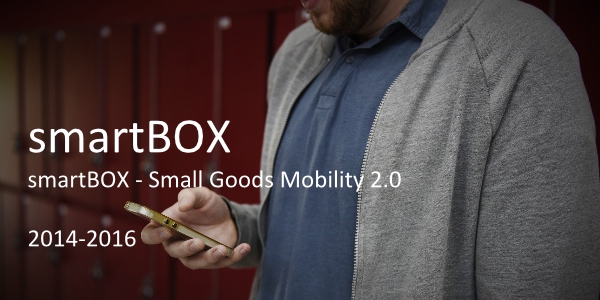smartBOX

The smartBOX project aims to revolutionise the growing transport needs in the field of goods mobility while at the same time reducing the scarcity of resources by designing an intelligent and holistic approach to solutions. Visionary mechanisms of autonomous traffic optimisation coupled with cross-sector transport and service models and the development of intelligent container, transport, information and communication technologies solve the challenges of growing small goods mobility, increase the quality of life and protect the environment by using the internet and new pool business models.
Client: bmvit, mobility of the future, 3rd call for tenders
Duration: September 2014 to August 2016 (24 months)
Project partners: Vienna University of Technology, Railway Research Department; St.Pölten University of Applied Sciences; Upper Austria University of Applied Sciences; Post AG; Chep; KEBA; promotion&Co
LOI partners: SBB – Swiss Federal Railways/ Transport & Logistics; DB-AG – Deutsche Bahn AG / Courier Baggage; Newrail – Newcastle University; DLR – German Aerospace Center; ZHAW – Zurich University of Applied Sciences
Project description: The transport of small goods (general cargo, luggage and parcels) is strongly increasing, not least due to increasing demand in online trade. However, today’s delivery services are relatively inflexible in terms of customer needs (e.g. personal presence at the delivery address or a personal pickup at a branch is required) and therefore not very customer-friendly. They are also inefficient due to often necessary multiple delivery attempts. An integrated system for autonomous small-goods transport in the future should make it possible to massively reduce the overall traffic volume with increasing transport requirements and at the same time promote passenger mobility through the development of a system for public goods transport. For example, people can also have small goods of various kinds transported instead of transporting them themselves by auto, which means that a type of public goods transport is installed parallel to public passenger transport.
In order to implement such an objective, the smartBOX research project included the design of the following system components:
Design of a standardised reusable container with its own intelligence for controlling and navigating the transports and for user-safe access (“smartBOX”).
Development of a pool system for making available, managing and controlling the public smartBOX transport units in the B2B and in the personal/private sector (B2C) using electronic tracking & tracing methods and using internet-based communication technologies (“Internet of Things”, GPS navigation, M2M”machine-to-machine communication” etc.).
Conception of vandalism-protected collection and loading terminals for the area-wide use at hotspots in public spaces or in private housing estates as well as the adaptation of goods- transfer stations (e.g. Expedit,..) for the B2B area (“smartTERMINAL”).
Conception of an intermodal multi-channel transport system for all transport service providers, which independently identifies and bundles transport requirements and avoids multiple journeys to users.
Design of the IT-functionality with emphasis on transparency and access protection of data under the premise of decentralised autonomous subsystems.
Conception of a business model that enables transport prices to be as favourable and distance-dependent as possible, covers the costs of the service providers and is also compatible with the systems of previous service providers.
The result of the research project smartBOX is the clear definition of all requirements (especially of users), the technical and economic possibilities and the real feasibility of the vision of an intelligent system of goods mobility and serves as the basis for a subsequent implementation project.
Contact: DI Dr. Bernhard Rüger
